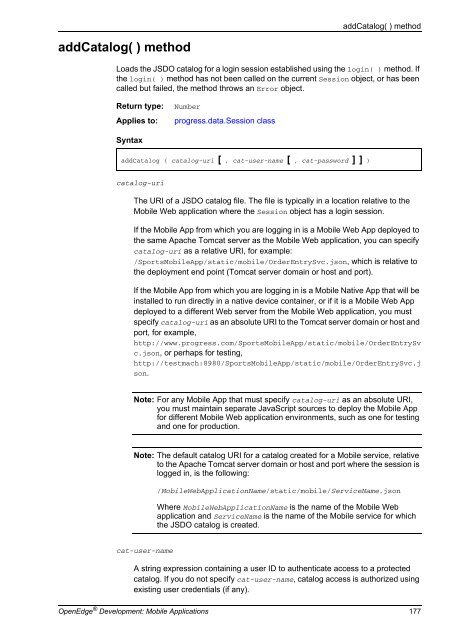OpenEdge Development: Mobile Applications - Product ...
OpenEdge Development: Mobile Applications - Product ...
OpenEdge Development: Mobile Applications - Product ...
You also want an ePaper? Increase the reach of your titles
YUMPU automatically turns print PDFs into web optimized ePapers that Google loves.
addCatalog( ) method<br />
addCatalog( ) method<br />
Loads the JSDO catalog for a login session established using the login( ) method. If<br />
the login( ) method has not been called on the current Session object, or has been<br />
called but failed, the method throws an Error object.<br />
Return type: Number<br />
Applies to: progress.data.Session class<br />
Syntax<br />
addCatalog ( catalog-uri [ , cat-user-name [ , cat-password ] ] )<br />
catalog-uri<br />
The URI of a JSDO catalog file. The file is typically in a location relative to the<br />
<strong>Mobile</strong> Web application where the Session object has a login session.<br />
If the <strong>Mobile</strong> App from which you are logging in is a <strong>Mobile</strong> Web App deployed to<br />
the same Apache Tomcat server as the <strong>Mobile</strong> Web application, you can specify<br />
catalog-uri as a relative URI, for example:<br />
/Sports<strong>Mobile</strong>App/static/mobile/OrderEntrySvc.json, which is relative to<br />
the deployment end point (Tomcat server domain or host and port).<br />
If the <strong>Mobile</strong> App from which you are logging in is a <strong>Mobile</strong> Native App that will be<br />
installed to run directly in a native device container, or if it is a <strong>Mobile</strong> Web App<br />
deployed to a different Web server from the <strong>Mobile</strong> Web application, you must<br />
specify catalog-uri as an absolute URI to the Tomcat server domain or host and<br />
port, for example,<br />
http://www.progress.com/Sports<strong>Mobile</strong>App/static/mobile/OrderEntrySv<br />
c.json, or perhaps for testing,<br />
http://testmach:8980/Sports<strong>Mobile</strong>App/static/mobile/OrderEntrySvc.j<br />
son.<br />
Note: For any <strong>Mobile</strong> App that must specify catalog-uri as an absolute URI,<br />
you must maintain separate JavaScript sources to deploy the <strong>Mobile</strong> App<br />
for different <strong>Mobile</strong> Web application environments, such as one for testing<br />
and one for production.<br />
Note: The default catalog URI for a catalog created for a <strong>Mobile</strong> service, relative<br />
to the Apache Tomcat server domain or host and port where the session is<br />
logged in, is the following:<br />
cat-user-name<br />
/<strong>Mobile</strong>WebApplicationName/static/mobile/ServiceName.json<br />
Where <strong>Mobile</strong>WebApplicationName is the name of the <strong>Mobile</strong> Web<br />
application and ServiceName is the name of the <strong>Mobile</strong> service for which<br />
the JSDO catalog is created.<br />
A string expression containing a user ID to authenticate access to a protected<br />
catalog. If you do not specify cat-user-name, catalog access is authorized using<br />
existing user credentials (if any).<br />
<strong>OpenEdge</strong> ® <strong>Development</strong>: <strong>Mobile</strong> <strong>Applications</strong> 177
















